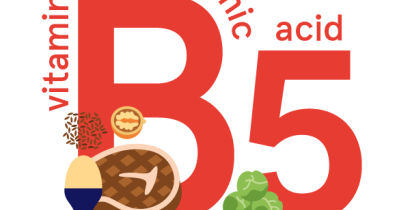Biotin: foods, functions, how much do you need & more
Last Updated : 11 January 2021Biotin is popularly known as a vitamin that promotes healthy skin, hair and nails. Yet, these are not its main functions in our body.
What is biotin?
Biotin is a water-soluble vitamin that belongs to the B-vitamins family. We can find biotin in a variety of foods.
What are the functions of biotin?
Biotin is involved in many bodily processes. Our bodies use biotin to convert nutrients into energy and to make fatty acids and glucose, which our cells use as a source of energy when there’s not enough available from foods.

How much biotin do I need per day?
How much biotin you need per day changes according to your age, sex and life-stage.
The dietary reference value (DRV)* set for healthy adults (over the age of 18), including during pregnancy, is 40 µg of biotin per day. During lactation, needs can go up to 45 µg of biotin per day.
We can get enough biotin from our diets by eating a variety of foods. Following your country's dietary guidelines on a healthy and balanced diet will help you meet your needs for biotin.

* These values are based on the adequate intakes (AI) estimates from the European Food Safety Authority (EFSA). They should not be interpreted as nutrient goals. To know more about DRVs in Europe click here.
What foods contain biotin?
We can find biotin in a variety of foods, but some of its richest sources include:
- meat and poultry
- fish
- eggs
- cheese
Some vegetables, cereals and nuts also contain good amounts of biotin. However, the amount of biotin in plant-based foods varies depending on factors such as the plants’ growing conditions, geography, and season.

Does biotin interact with other nutrients?
There are proteins in raw eggs that bind to biotin and prevent our bodies from absorbing it from foods. Thus, regularly eating raw eggs can impair our intake of this vitamin and potentially reduce its levels in our bodies.
What happens if I have too little biotin?
Biotin deficiency is rare in developed countries since most people get the recommended amounts of biotin from their diets. However, it can happen to people with a genetic disorder called “biotinidase deficiency” or to people who consume large amounts of raw eggs.
Biotin deficiency can cause skin disorders, hair loss, conjunctivitis (pinkeye) and poor muscle coordination and control. In children, it can slow their growth and development.
What happens if I have too much biotin?
It is unlikely to get harmful amounts of niacin through foods alone. Even if we exceed our daily needs, our bodies remove the biotin surplus through urine.
Before taking biotin supplements, check with your doctor or a registered dietitian/nutritionist or consult your national dietary guidelines.
When should I pay extra attention to my biotin intake?
Biotin deficiency is not a risk for the general population since most people can get the recommended amounts of biotin from a varied and balanced diet.
References
- European Food Safety Authority. 2014. Scientific Opinion on Dietary Reference Values for biotin. EFSA Journal 2014;12(2):3580
- World Health Organization (WHO) (2004). Vitamin and mineral requirements in human nutrition. 2nd edition. Geneva, Switzerland: WHO.
- Public Health England. 2019. McCance and Widdowson’s Composition of Foods Integrated Dataset.



